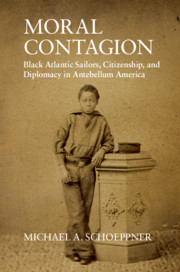(Source: CUP)
Cambridge
University Press is publishing a book dealing i.a. with the 19th
century “Negro Seamen Acts”.
ABOUT THE BOOK
Between 1822 and
1857, eight Southern states barred the ingress of all free black maritime
workers. According to lawmakers, they carried a 'moral contagion' of
abolitionism and black autonomy that could be transmitted to local slaves.
Those seamen who arrived in Southern ports in violation of the laws faced
incarceration, corporal punishment, an incipient form of convict leasing, and
even punitive enslavement. The sailors, their captains, abolitionists, and
British diplomatic agents protested this treatment. They wrote letters,
published tracts, cajoled elected officials, pleaded with Southern officials,
and litigated in state and federal courts. By deploying a progressive and
sweeping notion of national citizenship - one that guaranteed a number of
rights against state regulation - they exposed the ambiguity and potential
power of national citizenship as a legal category. Ultimately, the Fourteenth
Amendment recognized the robust understanding of citizenship championed by
Antebellum free people of color, by people afflicted with 'moral contagion'.
ABOUT THE AUTHOR
Michael A. Schoeppner, University of Maine,
Farmington
Michael A. Schoeppner is Assistant Professor
of History at the University of Maine, Farmington.
TABLE OF CONTENTS
Introduction
1. The
Atlantic's dangerous undercurrents
2.
Containing a moral contagion, 1822–9
3. The
contagion spreads, 1829–33
4.
Confronting a pandemic, 1834–42
5.
'Foreign' emissaries and rights discourse, 1842–7
6.
Sacrificing black citizenship, 1848–59
7. From the
decks to the jails to assembly halls: black sailors, their communities, and the
fight for black citizenship
Epilogue.
More
information here


No comments:
Post a Comment
Note: Only a member of this blog may post a comment.